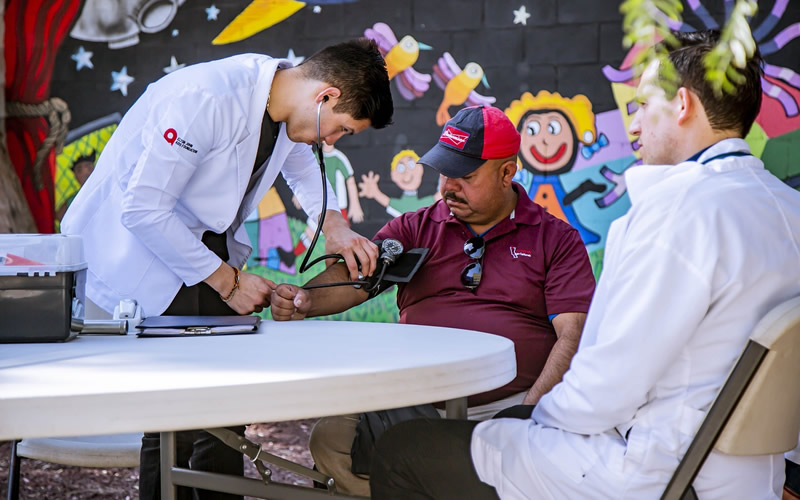
By Lindsay Street, Statehouse correspondent (updated 8/17/19) | In some ways, it’s easier to define how health care is changing by how it isn’t: It isn’t going to become more physician-centric.
“Right now, we provide care in a very delayed manner that is convenient for the doctor but not in a real-time way that is convenient for the patient,” Prisma Health Care Coordination Institute President & CEO Angelo Sinopoli of Greenville told Statehouse Report.
So, medical professionals like Sinopoli are calling on the Statehouse to help their industry evolve.
 Sinopoli was one of scores of health care stakeholders who participated in a recent report focused on the state’s health care workforce and how to meet the industry’s current and future demands. The S.C. Institute of Medicine & Public Health released its study on the evolving health care workforce study in June.
Sinopoli was one of scores of health care stakeholders who participated in a recent report focused on the state’s health care workforce and how to meet the industry’s current and future demands. The S.C. Institute of Medicine & Public Health released its study on the evolving health care workforce study in June.
“There’s a whole spectrum of workforce that is not produced today at a level that South Carolina is going to need going forward,” Sinopoli said. “This (report) is a unique opportunity for South Carolina … The key is going to be to get the delivery system — the physicians and the payers and the educational system — aligned in terms of what our future health care system needs to look like.”
According to the report, South Carolina is experiencing growing pains that much of the nation is experiencing: getting health care to the patient in better ways that include everything from telehealth to non-traditional aids to health, like a handyman who can make a home more accessible to an aging patient. The report outlines a variety of solutions from best practices, including some that can come from state lawmakers like tax credits for education.
“It’s a real, real challenge for us that we have to come together and try to address,” Sen. Thomas Alexander, R-Oconee, said. “Health care access and availability is so important for the well-being of our citizens.”
The report includes input from more than 60 stakeholders who focused on prevention, community settings and the social-environmental determinants of health and their implications for the workforce.
Essentially it all boils down to this: “We have to change how we deliver and view health and health care,” IMPH Senior Director of Strategic Engagement Megan Weis of Columbia told Statehouse Report.
Weis said the industry is being strained by rising costs, the need for integrated health and primary care, and changes in paying for individual services and lump-sum services. And those stressors are happening at a time with increased cases of sexually-transmitted diseases, obesity, opioid abuse and other behavioral health issues, she said.
“We live in a state that most of the lists that you see we are either at the bottom or the top,” Weis said. “But we are also on the forefront of initiatives like the one we just led … Our state is coming together to address these challenges and having health systems, academia, payers, nonprofits community organizations — everybody at a table moving forward is where we are really shining.”
She said the blueprint laid out in the June report will allow the state to tackle any current or future issue.
What lawmakers can do
The report urges action from hospitals, teaching institutions, bureaucrats and lawmakers. Weis said the state can provide a 24-hour caregiver hotline, encourage research initiatives for medical students, and aid with data sharing among big health systems.
The report estimated that in our state of 5 million people, there are more than 770,000 people caring for a family member or friend. IMPH is already working seeking to work with the state’s Office on Aging on developing a caregiver hotline.
The report also encouraged the state legislature:
- To continue to fund high school-level health career academies, to use of lottery funds to support medical education for minority and rural students, and to study low- or no-cost training and career counseling programs for direct-care workers;
- To support improved pay and reimbursement for behavioral health professionals; and,
- To aid in the diversity and training of more community-based professionals and specialized clinicians, and to fund incentives for health and human services professionals to receive education on screening tools for social determinants of health.

The June report said tax credits also should be explored to encourage entrance into the future workforce. Alexander said he sees lawmakers’ role as helping professionals get the training they need. In 2019, he introduced and successfully passed S. 314, an income tax credit for physicians, advanced practice nurses and physician assistants who serve as a student-guides during clinical rotations.
“Tax incentives are one way to level the playing field for public institutions trying to compete with private or for-profit entities that can afford to pay preceptors for accepting students,” the report said.
Alexander said he is reviewing further action for 2020.
“It’s going to be a process. (The evolving health care workforce) won’t be resolved in a year but we need to make sure that we are looking forward and trying to the best of our abilities to work on health care workforce issues, especially as we continue to have an aging population. It’s going to be in heavier demand,” Alexander told Statehouse Report.
He added that focusing on rural health, which the report included, is “an even greater need.”
- Have a comment? Send to: feedback@statehousereport.com















 We Can Do Better, South Carolina!
We Can Do Better, South Carolina!
Pingback: Statehouse Report: How S.C. lawmakers can help to make healthcare better - IMPH